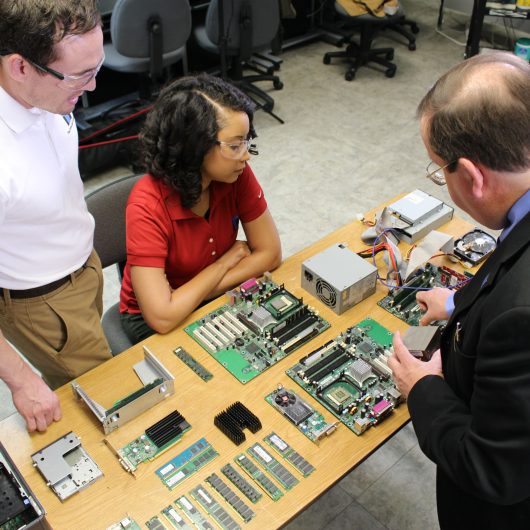After finishing information technology school and an information security degree, you’re going to find yourself in a position where you will work for a company as part of its IT team. Further on in your career, you may even become a consultant that provides expert advice for companies looking for security and general IT solutions.
In your IT and information security classes, you’ll learn about the systems and hardware that are in use today, and you’ll also find out which specific hardware is the most appropriate for any given scenario.
If your interest is with systems and hardware more than it is with software or networking, then making a decision between a hard drive and an SSD (solid state drive) is something that should definitely interest you.
Hard Drive vs SSD – Learn from a Leading Information Systems Security School
 If you already have an interest in technology and have performed your own research, then you may already know the fundamental differences between hard drives and SSDs. For those that are new to the subject, the differences can easily be broken down. First, we’ll discuss some of the similarities.
If you already have an interest in technology and have performed your own research, then you may already know the fundamental differences between hard drives and SSDs. For those that are new to the subject, the differences can easily be broken down. First, we’ll discuss some of the similarities.
Both devices are a form of non-volatile storage. Essentially, these are the devices that are used to store information on a computer or within a server. The difference between the two is not specifically related to what they do, but to how they do it.
A standard hard drive uses a spinning magnetic disc platter to store data. Modern technology allows for high storage capacity at competitive prices, and it’s not uncommon to see small and medium-sized businesses using 1, 2, and even 4 terabyte capacity drives for storing their valuable information. A spinning platter hard drive offers high amounts of storage for a relatively affordable cost, and this makes them highly popular with businesses, consumers, and even large data centers.
As an information technology security officer trainee, you will learn that SSDs have emerged as viable competition for mechanical spinning platter drives. SSDs, as the name implies, use a type of solid-state flash storage that uses no moving parts. Because data doesn’t have to be read from a spinning disk, the read and write times are faster (up to 5x faster in many cases), and the drive is also more reliable in some situations.
With this information, you might assume that this clearly indicates that an SSD is the best option. However, it’s not quite as simple as that.
Price Difference Determines Suitability
Hard drives are much cheaper than solid-state drives, and businesses can get access to higher-capacity storage without a huge investment. Even a smaller 250-gigabyte or 500-gigabyte solid-state drive is relatively expensive, so most businesses will be reluctant to use SSDs for large amounts of data storage.
As someone thinking about information systems security school, you will have an analytical mind, and you may even have formed your own opinion about the best solution for businesses. The answer is quite simple: it depends on the needs of the business and the specific application for the drive.
Because SSDs offer better speed, they’re more suitable for system drives in workstations. They allow fast loading of operating systems and regularly used applications. For large amounts of data storage, standard hard drives offer the best price per gigabyte ratio, and the best drives still have respectable speeds for data that is stored and accessed infrequently.
You’ll learn when studying for your information security degree that even hard drives can offer excellent data transfer rates when installed in a RAID configuration, and even the cost of using multiple drives will still be less expensive than using high-capacity SSDs.
Modern businesses need to be aware of the differences and best use case scenarios for hard drives and SSDs, and as an IT and information security training graduate, you’ll be the ideal person to provide information like this, and much more.
Get Started with Your Information Technology Security Certification
If you’re ready to start learning, you can enroll at the ITI Technical College. With information technology and information security degree programs, we’re here to give you the knowledge and certification that you need to do what you love in the world of IT.
For more information about graduation rates, the median debt of students who completed the program, and other important information, please visit our website: https://iticollege.edu/disclosures/

